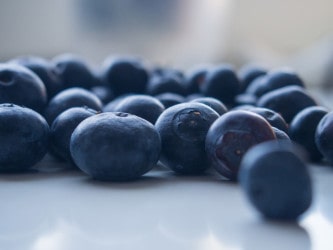nutrition
Blueberry Powder: A Tasty Way to Get All the Benefits of Fresh Blueberries
On This Page

Blueberries are packed with antioxidants. But can you eat enough of them every day to achieve maximum benefit? Thanks to blueberry powder, you don’t have to.
What is blueberry powder
Blueberry powder is essentially a powder made from freeze-dried blueberries. Found in most health stores and related retailers, it is commonly touted as an easy way to enjoy all the health benefits of the blueberry with the convenience of a powder that can be added to any food. Like the fruit itself, blueberry powder is said to be high in antioxidants, vitamin C, vitamin K, and fiber.
Blueberry powder versus blueberry extract
Blueberry powder contains the whole fruit, seeds, and skin of the blueberry. The freeze-drying process is extremely efficient and, therefore, preserves all of the antioxidants and various nutrients of the fresh blueberry. Blueberry powder is also rich in natural fiber and very low in sugar. Blueberry extract is made from concentrated blueberry juice. The processing removes most of the fiber you can get in fresh berries (and in blueberry powder).
Health benefits of blueberry powder
Blueberry powder is used to promote cardiovascular, immune, brain, and gut health. Because it is so high in antioxidants, low on the Glycemic Index and high in fiber, it is purported to be beneficial in regulating blood sugar levels already within normal range.
Aids in cardiovascular health
Flow mediated dilation was measured and increased in participants consuming blueberries at 1, 2, and 6 hour intervals after consumption. Blueberries and blueberry powder are rich sources of polyphenols. This abstract concludes that polyphenol rich diets have been associated with promoting cardiovascular health and promoting optimal aging.
Antioxidant properties
Antioxidant levels increase with consumption of fruits and veggies. Blueberries and blueberry powder are high in antioxidants. Berries and pomegranates have the highest content of cellular activity. Anthocyanins are antioxidants found in red, blue, and purple fruit and veggies. They promote endothelial function (the cell lining of blood vessels) by nitric oxide dependent relaxation of arteries.
May promote cognitive function
Recent research seems to indicate that blueberries and blueberry powder have benefits to cognitive function. This study found that 3 months of whole blueberry intake may promote episodic memory in healthy older adults. Effective results were not found for the working memory, executive function, or mood tests so, while promising, more research, especially at higher dosage, is necessary.
Promotes healthy cholesterol levels already within normal limits
Animal trials found a positive impact on lipid profiles of Zucker rats after 8 weeks of consumption of wild blueberries. This consumption also positively impacted the expression of key enzymes and transcription factors in lipid and cholesterol metabolism. There were mixed results in human studies, however. More research is required.
Boosts bone health
According to this study, moderate consumption of freeze-dried blueberry powder can help boost net bone calcium. The effective doses studied included 17.5 grams (equivalent to ¾ of a cup of fresh blueberries) and 30 grams (equivalent to 1 ½ cups of fresh blueberries) over a 6 week time frame. High doses considered at 70 grams (equivalent to 3 cups of fresh blueberries) did not produce any significant changes in the participants. Overall, the key for effective results was moderate blueberry intake. Additionally, anthocyanin metabolites may impact osteoblasts (cells that form bone tissue). Anthocyanins are responsible for the red, blue, and purple colors that are naturally found in foods.
How much blueberry powder should I take
Generally speaking, one TBSP of blueberry powder is equivalent to ½ cup of fresh blueberries, so anywhere from 1 tsp to 2 TBSP is typically recommended. Check the label for product specific recommendations. It is always best to consult your physician or healthcare provider with any questions about dietary supplementation.
How to use blueberry powder
Blueberry powder is a great addition to smoothies, yogurt, tea, almond milk, hot cereal (like oatmeal), baked goods, and fruit leather. It is also a natural colorant for dips, creams, and desserts. Using blueberry powder is an easy way to add delicious blueberry flavoring to any snacks or desserts.



